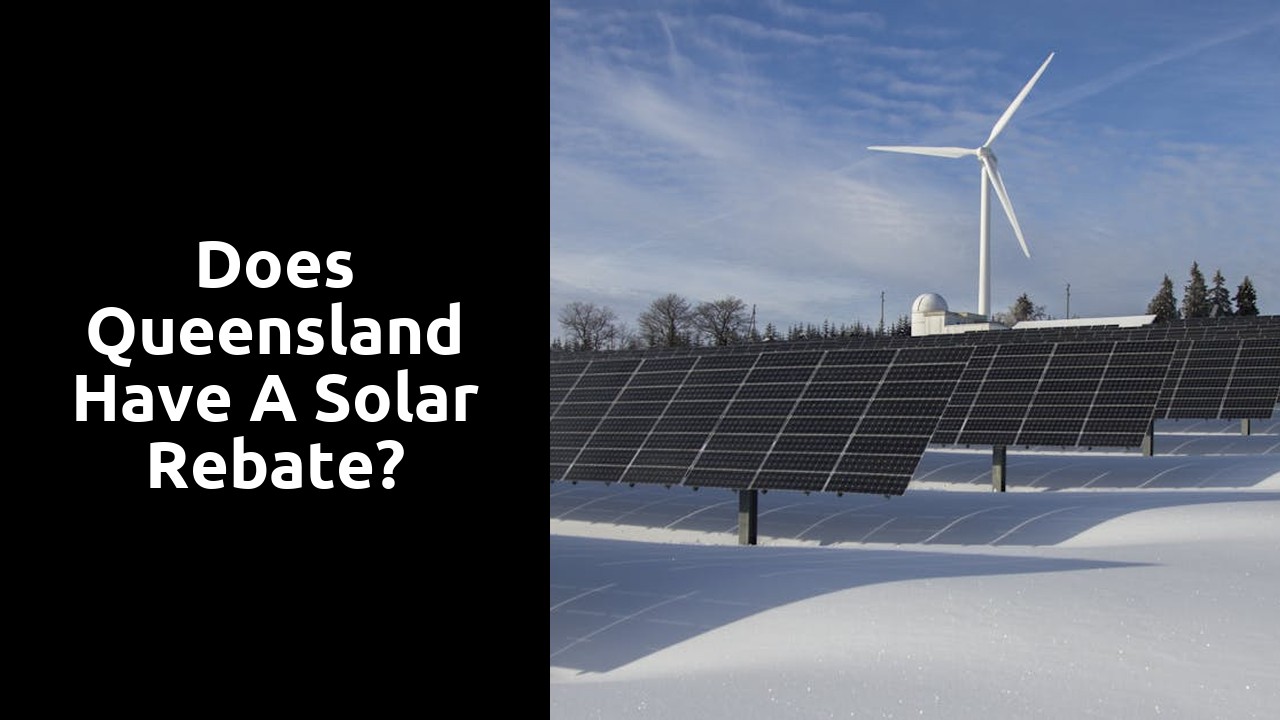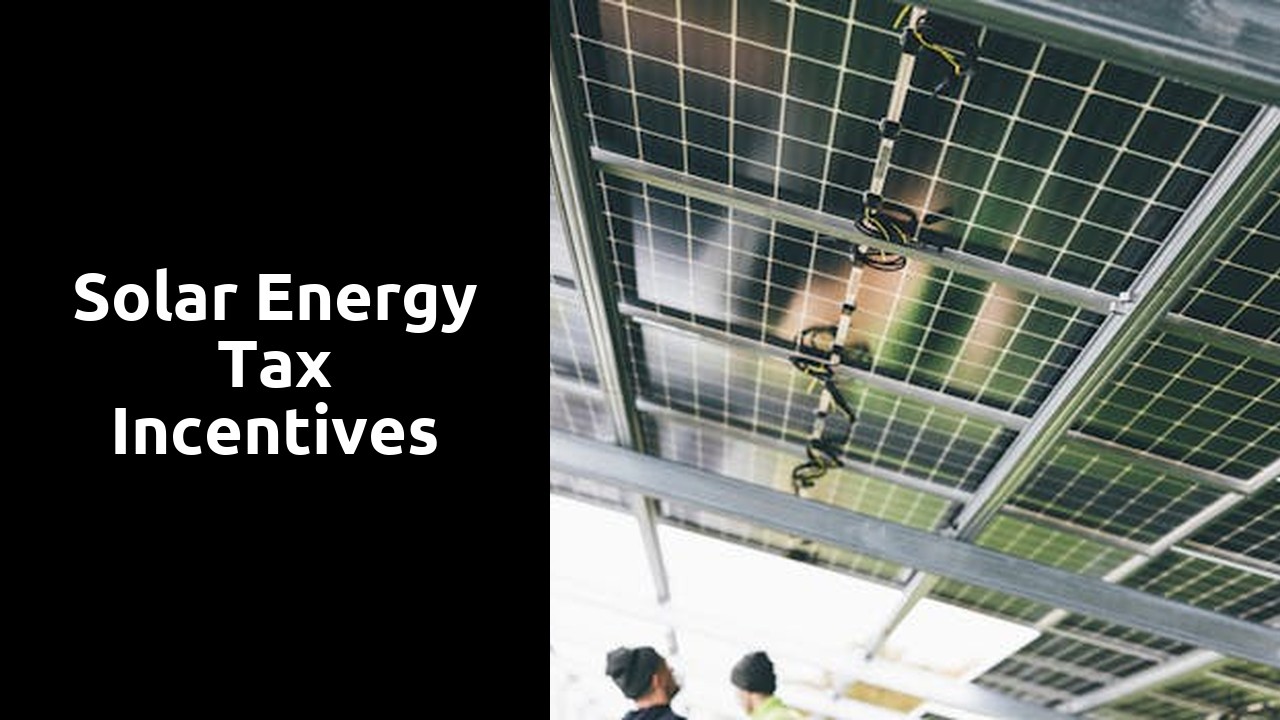
Table Of Contents
Understanding the Queensland Solar Rebate System
When it comes to understanding the Queensland Solar Rebate System, it is essential to grasp the concept of Solar Energy Tax Incentives. In Queensland, the state government provides incentives in the form of rebates to encourage the uptake of solar energy. These rebates serve as a financial incentive for households and businesses to invest in solar panels, thereby reducing their reliance on grid electricity and contributing to a more sustainable energy future.
To benefit from the Queensland Solar Rebate, individuals need to meet certain eligibility criteria. These criteria usually focus on factors such as the size of the solar system being installed, the type of property the system is being installed on, and whether the installer is accredited by the Clean Energy Council. By understanding these eligibility requirements, Queensland residents can take full advantage of the solar rebates available to them and make a positive impact on both the environment and their electricity bills.
Eligibility Criteria for Queensland Solar Rebate
To be eligible for the Queensland solar rebate, residents must meet specific criteria set forth by the government. Firstly, applicants must be homeowners residing in Queensland to qualify for the rebate. Additionally, the property where the solar panels will be installed must be a primary place of residence. Furthermore, the solar panels must be installed by a Clean Energy Council accredited installer to ensure compliance with safety and quality standards.
Moreover, applicants must not have previously received a solar rebate for the same property. It is essential to note that individuals who have already accessed state-funded solar schemes may not be eligible for the Queensland solar rebate. Additionally, to maximise the benefits of the solar rebate program, homeowners should be aware of other solar energy tax incentives offered by the government to encourage the transition towards renewable energy sources.
Benefits of Installing Solar Panels in Queensland
Installing solar panels in Queensland comes with numerous benefits for homeowners and businesses alike. One of the key advantages is the substantial savings on electricity bills. By harnessing the power of the sun, individuals can reduce their reliance on traditional energy sources and see a noticeable drop in their monthly energy expenses. In addition to the cost savings, utilizing solar energy promotes environmental sustainability by decreasing carbon emissions and reliance on non-renewable energy sources. This not only benefits the individual but also contributes to the overall effort of reducing the carbon footprint.
Moreover, residents of Queensland can take advantage of Solar Energy Tax Incentives when they install solar panels. These incentives provide financial benefits to those who invest in renewable energy solutions, making solar panels a financially attractive option. By leveraging these incentives, individuals can recoup a portion of their investment in solar panels, making the switch to solar energy even more appealing. Ultimately, the benefits of installing solar panels in Queensland extend beyond just financial gains, encompassing environmental stewardship and a step towards a more sustainable future.
Factors Affecting the Amount of Solar Rebate in Queensland
Solar energy tax incentives play a vital role in determining the amount of rebate one may receive in Queensland. These incentives are influenced by various factors including the size of the solar panel system installed. Larger systems tend to attract higher rebates due to their capacity to generate more renewable energy. Additionally, the type of solar panels chosen impacts the rebate amount. High-efficiency panels often lead to increased rebates as they are capable of producing more electricity from sunlight.
Moreover, the location of the property in Queensland affects the solar rebate amount. Properties situated in areas with higher levels of sunlight exposure are likely to receive higher rebates as they can generate more solar energy. Furthermore, the current government regulations and policies related to renewable energy play a significant role in determining the rebate amount. Understanding these factors is crucial for those seeking to maximize their benefits from the Queensland solar rebate program.
How to Apply for the Queensland Solar Rebate
To apply for the Queensland Solar Rebate, individuals must first ensure that they meet the eligibility criteria set forth by the state government. This includes being a homeowner or occupying a property with the authority to make changes to the electricity account. Additionally, the residence must not already have a solar power system installed and must be located in Queensland. It's important to note that meeting these criteria is essential for the successful application for the solar rebate in Queensland.
Once eligibility is confirmed, applicants can proceed with the application process. This typically involves completing a form provided by the relevant government department and submitting it along with the required documentation. The application will be processed by the authorities, and if successful, the rebate amount will be deducted from the total installation cost. By taking advantage of solar energy tax incentives, residents of Queensland can not only reduce their carbon footprint but also save money on their electricity bills in the long run.
Required Documentation for Queensland Solar Rebate Application
To apply for the Queensland Solar Rebate, applicants must ensure they have all the necessary documentation ready for submission. These documents help verify the eligibility of the applicant and ensure a smooth process for claiming the rebate. Some of the essential documents required include proof of identity, current electricity bills, and evidence of solar panel installation by a Clean Energy Council accredited installer. Additionally, applicants need to provide details of their solar panel system along with its specifications and compliance certificates to demonstrate its eligibility for the rebate.
Furthermore, individuals applying for the Queensland Solar Rebate should also include their Australian Business Number (ABN) or Tax File Number (TFN) as part of the documentation. This information is crucial for the authorities to process the rebate efficiently. Additionally, applicants must provide evidence of payment for the solar panel system installation, along with any receipts or invoices associated with the project. By submitting all the required documentation accurately and promptly, applicants can expedite the process of claiming their Solar Energy Tax Incentives in Queensland.
FAQS
Is there a solar rebate available in Queensland?
Yes, Queensland offers a solar rebate to encourage the installation of solar panels.
Who is eligible for the Queensland solar rebate?
Homeowners, renters, and landlords in Queensland who meet the eligibility criteria can apply for the solar rebate.
What are the benefits of installing solar panels in Queensland?
Installing solar panels in Queensland can help reduce electricity bills, lower carbon footprint, and increase the value of your property.
What factors can affect the amount of solar rebate in Queensland?
The size of the solar system, location, orientation of panels, and household energy consumption are some factors that can influence the amount of the solar rebate in Queensland.
How can I apply for the Queensland solar rebate?
To apply for the Queensland solar rebate, you need to follow the application process outlined by the relevant authorities and provide the necessary documentation to support your application.
